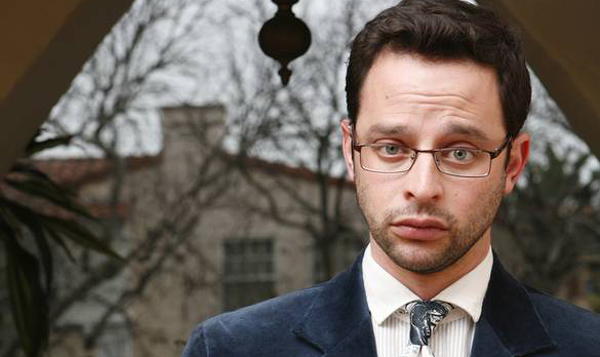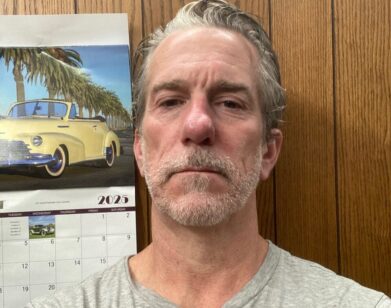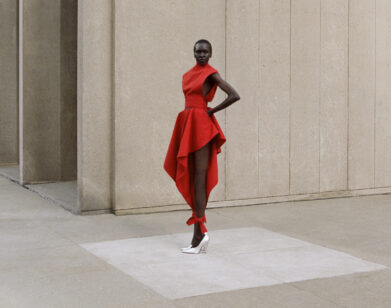The Many Faces of Nick Kroll

ABOVE: NICK KROLL.
Comedian Nick Kroll is currently holding down about five jobs, and that’s a conservative estimate. He stars as Ruxin, a cynical lawyer on FX’s The League, has a successful stand-up career, appears on countless comedy podcasts, occasionally takes the odd film role, and is set to star on The Kroll Show, premiering January 16 on Comedy Central.
Kroll gained recognition from the network after his stand-up special Thank You Very Cool aired in 2011. Two years later, the comedian, whose past résumé boasts lead roles on HBO’s animated series The Life and Times of Tim and the Geico commercial-based sitcom Cavemen, could not be more prepared to helm his own sketch comedy show in the new year.
Before ever setting foot in the writers’ room, Kroll brought with him a well-established roster of characters that have been popularized on podcasts such as Comedy Bang Bang and through viral Funny or Die videos, including the Ed Hardy-wearing Bobby Bottleservice, flamboyant craft services coordinator Fabrice Fabrice, Latin radio personality El Chupacabra, and Gil Faizon, one half of the Upper West Side, PBS-tote bag yielding duo on The Oh Hello Show (the other half being Saturday Night Live writer and Kroll’s comedy partner John Mulaney).
Interview recently spoke to the 34-year old comedian about the truth in his comedy, turning out a never-ending supply of jokes, and his impressive multitasking skills in the entertainment industry.
LAURIE KAMENS: How did The Kroll Show come about?
NICK KROLL: I did a special for Comedy Central a couple of years ago called Thank You Very Cool. It was a combination of stand-up and a bunch of my characters, all integrated into one night. I had done some stand-up and a bunch of sketches on the network over the last six to seven years, and then me and [executive producers] Jon Daly and Jonathan Krisel made a pilot for them, a 15-minute show. They didn’t make 15-minute shows, but between [that] and all the characters in my special they were like, we’d really like to make a sketch show with you, so we set out from there.
KAMENS: How do you develop your characters?
KROLL: Through various forms; some of them are built from real life, viewing people, some of them are built from watching characters on TV and taking archetypes, or one of the writers will be like, “You gotta watch this Mexican trainer!” and then going off and writing our version of that.
KAMENS: What would you say makes a good character?
KROLL: For me, the best characters are the ones that feel fully formed inside and out, so I try to have a very clear vision of exactly what they would wear, top to bottom, who they are, what their backstory is, what their family situation is, who are their friends, just creating as much of a three-dimensional character [as possible]. Because I think you could do a very broad character, but as long as there’s some emotional truth to them you can get away with really crazy things, you know?
KAMENS: You have managed to make quite a presence for yourself on the Internet through your frequent appearances on comedy podcasts and Funny or Die videos. What do you think the impact of social media has been on developing and honing your characters?
KROLL: It’s awesome. There are so many different ways to be a comedy fan and so many different outlets for people to find out about your stuff so [they] can get familiar with [your] characters. It also gives you a chance to develop characters further, so I’ve spent hours now improvising on podcasts and twitter, developing stuff further and discovering new stuff with them each time. Between podcasts and places like Funny or Die or CollegeHumor, there are so many venues to get the word out. It makes it difficult in that there’s a never-ending desire for content so you have to constantly be turning stuff out, but that makes you better and more prolific in general. So I think that the web and its various facets are incredibly useful in just building a fan base and getting your chops better.
KAMENS: How did you originally get your start in comedy?
KROLL: I started doing improv and sketch at Georgetown University, where I [worked] with Mike Birbiglia, John Mulaney, and a bunch of other very funny people, and then moved to New York and started [performing at] the Upright Citizens Brigade Theater and [doing] stand-up and open mics simultaneously. Eventually [I] started hosting a show with my friend Jessi Klein at Rafifi in East Village, and John Mulaney and I started hosting the show there when Jessi moved to LA. Then I moved to LA and started shooting and making more videos and sort of doing stand-up simultaneously with all that.
KAMENS: So did you start out doing stand-up or sketch first, or did you tackle it all once?
KROLL: Sketch was more in college, and then when I moved to New York I started doing stand up. I was just trying to get onstage as many nights a week as possible whatever form that took, whether it was going to open mics or doing an improv show, a sketch show, a character show—whatever it was that was getting me writing and up on stage and developing both the stand-up and the characters, and also just meeting as many comedians and writers as possible. That’s the beauty of the performance world, especially in mixing it up, is that you keep amassing more and more people who you can collaborate with, work for, [or] can work for you. Almost every person who wrote on [The Kroll Show] or was a major character in the show are people that I had worked with through the years and developed friendships [or] professional relationships with.
KAMENS: Which form of comedy do you prefer, writing, acting, or stand up?
KROLL: I find myself really loving all of them. The more I get to do all of them, the more I love them. I’m very lucky, because in most jobs you do one thing, but in my line of work right now, it’s like you go and write for the day and it’s exciting. Its fun, you’re just sitting around kind of fucking around with your friends and you come up with a flurry of ideas, and then after a couple of weeks its like, I need the immediate gratification of laughter, and then you can go and do a show that night. And then it’s like, you want to start making stuff, so you start shooting it, and then you’re exhausted from waking up at six in the morning and shooting ’til eight at night, and you go to edit it, and you start tweaking it, fixing all the dumb shit you said on set, and then you start forming things that you never even thought you could do. And then you get to talk to [the media] about your show and you get to talk about yourself. Although I’m beginning to have the inklings of getting sick of that, so I’ll just go run around Bolivia and Peru for a couple of weeks and hopefully come back recharged.
KAMENS: So you have a role on a TV sitcom, you tour the country doing stand-up, you’re constantly featured on comedy podcasts, you put out various viral videos… how do you manage to juggle all of your commitments?
KROLL: [pauses] I don’t know. I’m lying in a bed right now as I talk to you. The only answer I can give you is that I just fucking love doing comedy and its the only thing in my life that never felt like work. I mean, there’s things that are not fun that go into performing or making a show, but the ends always justify the means… and the end goal means that I get to make a sketch show with my friends that I just have so much fun writing it, making it, editing it, it’s such a pleasurable experience for me. I feel like I’m in such a rare position right now in that I’m able to make exactly what I want with the people I want to make it with, and hopefully people will see it.
THE KROLL SHOW PREMIERES JANUARY 16 ON COMEDY CENTRAL. FOR MORE ON NICK KROLL, VISIT HIS WEBSITE.






